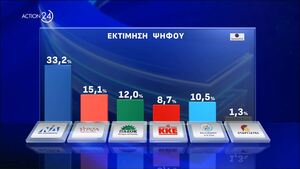Greece can become another 'success story', ESM's Regling says

Greece can become another "success story" if it continues to implement reforms after the end of the programme on August 20, European Stability Mechanism (ESM) Managing Director Klaus Regling said on Thursday, during the presentation of the ESM's annual report for 2017.
In the report, Regling stressed that: “The past year was another visible indication of how reforms and economic adjustments bring tangible results. Four of the five countries that were in EFSF or ESM assistance programmes are clear success stories. Greece has a chance to join this group, if it continues to implement reforms, also after the end of its programme on 20 August.” He added: “The ESM makes the monetary union more robust, and enhances the resilience of its economy. These are not abstract concepts: it means fewer job losses, and less economic damage when the next crisis hits. As a result of ESM and EFSF lending terms, our five beneficiary countries saved a total of 16.6 billion euros in debt service payments in 2017, compared to the assumed market cost of funding. Greece alone saved 12 billion euros last year, the equivalent of 6.7 pct of the country’s GDP.”
The annual report stressed that Greece returned to financial markets in 2017, supported by economic growth and successful reform implementation under the second and third reviews of the ESM programme. Despite strengthened market confidence, the Greek economy faces a difficult economic and financial environment. Greece must address remaining challenges before the programme concludes to ensure that it can build upon its significant programme achievements in the post-programme period.
In 2017, Greece made substantial progress in implementing reforms under the ESM programme, which aims at restoring fiscal sustainability, safeguarding financial stability, boosting growth, competitiveness, and investment, as well as fostering a modern state and public administration. The government also continued clearing arrears using ESM funds and its own resources, and thereby provided direct support to the real economy. The officially recorded stock of arrears, including tax refunds, stood at 3.3 billion euros at the end of 2017, the lowest level since December 2014.
Following successful policy implementation in the second and third reviews, the ESM governing bodies approved financial assistance of 15.2 billion euros between July 2017 and March 2018, of which 3.1 billion euros was allocated to arrears clearance. As a result, 45.9 billion euros of the up-to-86 billion euro programme envelope was disbursed since the initiation of the programme, with, however, just 43.9 billion euros currently outstanding as Greece prepaid 2.0 billion euros in February 2017 related to the redemption of contingent convertible bonds (CoCos) from a bank recapitalisation in which it used ESM funding. Up to 39.1 billion euros is available until the programme ends in August 2018. Part of this amount should be disbursed in the final programme review, while the rest might be used as part of possible debt measures to be decided by the end of the programme.
Greece has made significant progress in stabilising its economy. Continuing on this path is decisive for the sovereign to regain stable market access. Timely implementation of outstanding reform commitments will be important to further strengthen the economy and solidify market confidence, the report said.
Source: amna-mpa













